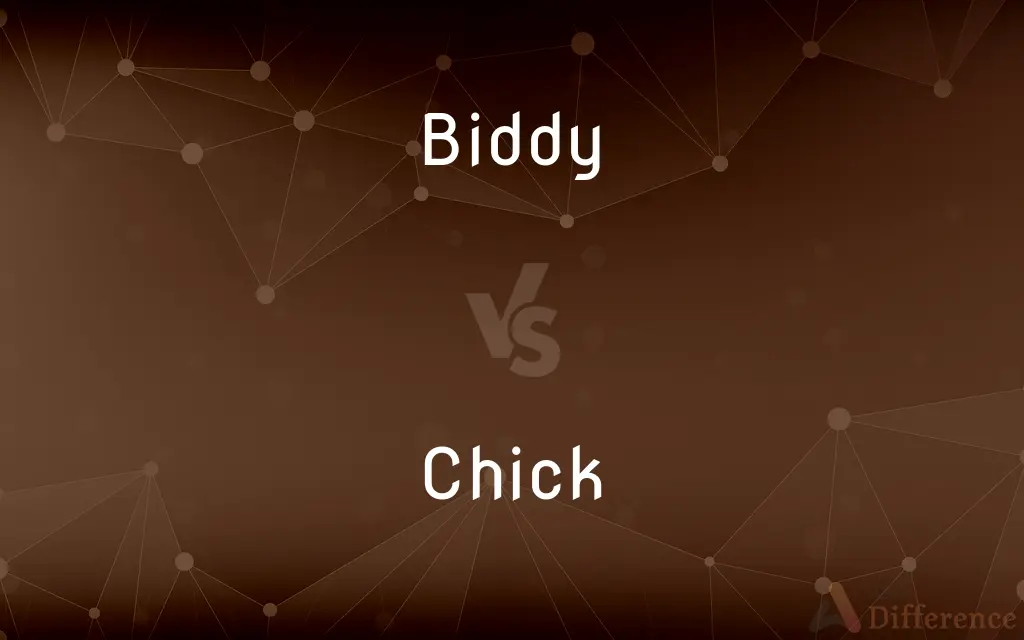Biddy vs. Chick — What's the Difference?
By Maham Liaqat & Fiza Rafique — Updated on April 1, 2024
Biddy often refers to an old woman or hen, while chick denotes a young chicken or informally, a young woman.

Difference Between Biddy and Chick
Table of Contents
ADVERTISEMENT
Key Differences
Biddy and chick represent different life stages and contexts, with biddy traditionally used to describe an old woman or a mature hen, implying age and, at times, pejoratively referencing demeanor. Whereas, chick is commonly used to refer to a baby chicken, or colloquially, a young woman, often with implications of youthfulness and sometimes affection or triviality.
In the realm of poultry, a biddy specifically denotes a female chicken that has reached maturity, playing a significant role in egg production within the agricultural context. On the other hand, chick is a term that encapsulates the earliest stage of a chicken's life cycle, highlighting the innocence and vulnerability associated with youth.
The use of biddy to describe an old woman can carry connotations of nagging or fussiness, reflecting societal attitudes toward aging, particularly among women. Chick, when used to refer to a young woman, can vary in connotation from endearing to diminutive, depending on the speaker's intent and the context, illustrating the fluidity of language in reflecting social perceptions.
The term biddy, when applied to humans, is often considered derogatory or at least dismissive, highlighting negative stereotypes associated with older women. Conversely, chick, despite its potential for trivialization, can also be seen in a light-hearted or affectionate manner, especially in casual conversations, indicating the complexities of language in conveying attitudes and relationships.
While biddy has its roots in a more dated vernacular, suggesting a declining usage in contemporary language except in specific or humorous contexts, chick remains prevalent in everyday speech, especially among younger demographics, signaling its continued evolution and adaptability in English lexicon.
ADVERTISEMENT
Comparison Chart
Definition
An old woman or hen
A young chicken or informally, a young woman
Connotation
Often pejorative when referring to women; neutral for hens
Can be affectionate or diminutive; neutral for baby chickens
Usage Context
More traditional, can be derogatory
Casual, varies from affectionate to trivializing
Life Stage
Mature hen or older woman
Baby chicken or young woman
Cultural Implication
Negative stereotypes of aging in women
Youthfulness, sometimes triviality in women
Compare with Definitions
Biddy
A mature female chicken.
The farmyard was dominated by an authoritative biddy clucking at her brood.
Chick
A young chicken, especially newly hatched.
The children were delighted to see a chick emerge from its shell.
Biddy
A term reflecting societal attitudes toward aging women.
In stories, the biddy often embodies wisdom or forewarning.
Chick
Used colloquially to denote youthfulness.
The band's concert was filled with chicks and dudes enjoying the music.
Biddy
Used to denote fussiness or nagging traits.
He jokingly called his meticulous aunt a biddy.
Chick
Informally, a young woman.
The movie is about a group of chicks navigating their first year of college.
Biddy
An old woman, often used pejoratively.
The tale featured a biddy who was the secret keeper of the village.
Chick
A term of endearment or trivialization.
He referred to his younger sister as his little chick.
Biddy
A female bird, especially a domestic hen.
Our biddy just laid her first egg of the season.
Chick
Referring to the early stages of a chicken's life cycle.
Feeding the chicks requires a special kind of feed to ensure their growth.
Biddy
Biddy or Biddie is a given name which may refer to:
Chick
A young bird, especially one newly hatched
The cattle egrets hatched and reared two chicks
Cuckoo chicks
Biddy
A hen; a fowl.
Chick
A young woman
She's a great-looking chick
Biddy
A woman, especially an older one who is extremely talkative.
Chick
(in South Asia) a folding bamboo screen for a doorway.
Biddy
(derogatory) A woman, especially an old woman; especially one regarded as fussy or mean or a gossipy busybody.
Chick
A young chicken.
Biddy
(uncommon) An attractive girl.
Chick
One of the young of any bird.
Biddy
An Irish maidservant.
Chick
A child.
Biddy
An Irishwoman.
Chick
Often Offensive A girl or young woman.
Biddy
A name used in calling a hen or chicken, often as "biddy-biddy-biddy".
Chick
A young bird.
Biddy
A name used in calling a hen or chicken.
Chick
A young chicken.
Biddy
An Irish serving woman or girl.
Chick
A young child.
Biddy
Young bird especially of domestic fowl
Chick
A young, typically attractive, woman or teenage girl.
They're going to have a chick weekend. No guys allowed.
He'll fall for any chick with a nice smile.
Chick
A friendly fighter aircraft.
Chick
A screen or blind made of finely slit bamboo and twine, hung in doorways or windows.
Chick
(obsolete) To sprout, as seed does in the ground; to vegetate.
Chick
To compress the lips and then separate them quickly, resulting in a percussive noise.
Chick
To sprout, as seed in the ground; to vegetate.
Chick
A chicken.
Chick
A child or young person; - a term of endearment.
Chick
A young woman; - often considered offensive.
Chick
Young bird especially of domestic fowl
Chick
Informal terms for a (young) woman
Common Curiosities
What does chick mean?
Chick can refer to a young chicken or, informally, to a young woman.
Are there positive connotations to the term biddy?
While traditionally negative when applied to women, biddy can be neutral or even affectionate in certain contexts, especially when referring to hens.
What is a biddy?
A biddy is a term that can refer to a mature female chicken or pejoratively to an old woman.
Why might someone use the term chick in conversation?
Chick is often used informally to refer to young women in a light-hearted or casual manner.
How are biddies important in agriculture?
Biddies, or mature hens, are crucial for egg production in farming practices.
What are the implications of using age-based descriptors like biddy?
Using terms like biddy can perpetuate age-based stereotypes and potentially disrespect the individuals described.
Is calling someone a biddy offensive?
Referring to someone as a biddy can be considered offensive, especially if used to highlight negative stereotypes about aging.
Can chick be used affectionately?
Yes, chick can be used affectionately to refer to a young woman, though context matters.
Can chick have negative implications?
Depending on context, chick can be seen as trivializing or diminishing the person it describes.
What's the difference between a chick and a chicken?
A chick is a baby chicken, representing the early life stage of the bird.
Is it common to use chick to describe men?
It's less common and typically chick refers to females, both in humans and chickens.
Is the use of biddy common today?
The use of biddy is less common and may be seen as outdated or derogatory.
How do societal attitudes shape the use of these terms?
Societal attitudes toward age and gender influence how and when these terms are used and understood.
Do the terms have different implications in various cultures?
Yes, cultural perceptions can influence the connotations of both biddy and chick.
Are there efforts to reclaim or redefine these terms?
There are movements to reclaim or redefine terms that have been historically pejorative, including efforts to shift perceptions around aging and femininity.
Share Your Discovery

Previous Comparison
Repayment vs. Payment
Next Comparison
Face vs. FacetAuthor Spotlight
Written by
Maham LiaqatCo-written by
Fiza RafiqueFiza Rafique is a skilled content writer at AskDifference.com, where she meticulously refines and enhances written pieces. Drawing from her vast editorial expertise, Fiza ensures clarity, accuracy, and precision in every article. Passionate about language, she continually seeks to elevate the quality of content for readers worldwide.















































